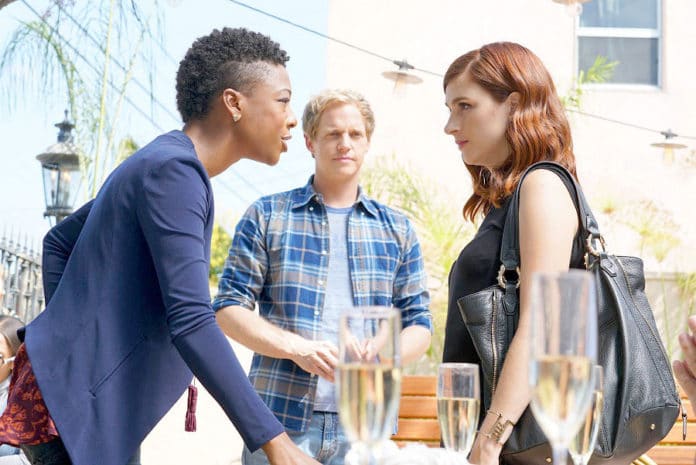It’s the highest compliment I can give “You’re The Worst” that FX’s comedy about a group of ill-behaving Angelenos struggling through love and life that there’s probably no show on television that gives me more pure, transporting pleasure, or makes me feel more pain.
And so it’s highly fitting that the show’s third season wrapped up with an hour-long finale full of both. And for my purposes as a critic who writes about culture and politics, “You Knew It Was a Snake” and “No Longer Just Us” are, collectively, a master class in showing how politics play out in personal contexts.
As Lindsay (Kether Donohue) and Paul (Allan McLeod) begin the process of breaking up for real this time, “You’re The Worst” acknowledges the validity of Paul’s anger about Lindsay’s abortion without giving up the idea that she had the right to do what she did. Lindsay may overuse the slogan “my body, my choice” to the point of utter meaninglessness, but just because she’s an unworldly dope doesn’t mean she’s wrong. Showing its usual admirable ability to comprehend that multiple complex ideas can co-exist at once, “You Knew It Was a Snake” has both respect for Paul’s profound anger and sorrow that Lindsay would make this decision without him, even as it’s clear that this was absolutely the right decision to make.
Necessary choices can still be made in ways that cause good people pain, without invalidating the fundamental correctness of the decision. And just as the exercise of our rights doesn’t always proceed smoothly, just because something is a right doesn’t mean consequences don’t flow from it.
Edgar (Desmin Borges) and Dorothy’s (Collette Wolfe) argument about which one of them faces a greater disadvantage in comedy proceeds along similar lines. They’re both correct that they face substantial obstacles.
Dorothy has faced horrific and persistent sexual harassment from her colleagues in comedy, and the narrow window during which women are considered sexually desirable by Hollywood means that Dorothy has been disqualified from a certain class of roles before she even landed one. And Edgar is right that Latinos are dramatically underrepresented in pop culture, meaning that there’s simply a lower demand for people like him than for people who fall into the same broad category as Dorothy: white women.
But their fight isn’t entirely, or even really, political; it’s not as if Dorothy even had a chance to compete for the job that Edgar’s been offered. They’re simply on trajectories, inflected by race, gender and class, that make it difficult for them to provide the support each other needs. In Edgar’s success, Dorothy can only see the reflection of her own stalled career. And in Dorothy’s misery, Edgar sees his own bleak despair. They love each other, but they’re afraid of what the other one represents.
In both stories, big issues are necessary, but insufficient to explain what’s going on. Part of the reason “You’re The Worst” manages to feel so emotionally acute and lived-in, even as the show maintains its theatricality and functions as a well-tuned joke machine, is that it doesn’t artificially separate politics from its characters’ lives. Jimmy, Gretchen, Lindsay, Paul, Edgar and Dorothy live in a world where questions of race and gender and abortion access are material to their decisions and their happiness.
This makes “You’re The Worst” a realistic show, rather than a primarily political one. And so it’s fitting that this pair of episodes is framed by Jimmy (Chris Geere) and Gretchen (Aya Cash), whose relationship is determined by their inner states rather than external pressures. “You’re The Worst” seems to have wrapped up Gretchen’s therapy prematurely, but she’s certainly learned something in the process.
Jimmy, by contrast, is still in a place where he believes, in an almost magical way, in the power of gestures, be it a heckling session, a tree-house construction project, or a proposal. He hasn’t yet learned that a gesture is the beginning of something, not the thing itself.
What comes now that Paul and Lindsay are divorcing, or that Edgar and Dorothy have broken up, or that Becca (Janet Varney) and Vernon (Todd Robert Anderson) are parents, or that Jimmy’s gotten into his car and driven away? “You’re The Worst” has gotten to the hardest, and realest, part of its story.






